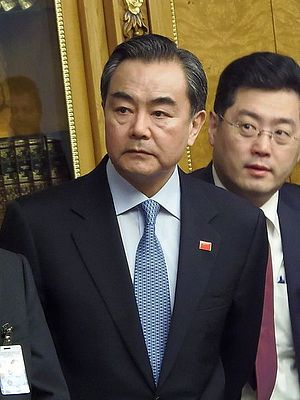China has been actively expanding its influence to the Middle East, and engaging war-torn Syria as part of its signature Belt and Road Initiative (BRI) has been a case in point.
On November 24, Chinese Foreign Minister Wang Yi met with Political and Media Advisor to the Syrian President Bouthaina Shaaban in Beijing. During the meeting, Wang offered to support Syria’s reconstruction.
In early November, Syrian government forces and their pro-government allies announced that they won another victory over Islamic State of Iraq and Syria (ISIS) militants and were in full control of Deir el-Zour, the largest city in eastern Syria. The Syrian government led by President Bashar al-Assad appears to be winning the war against ISIS for now.
According to Chinese foreign ministry, during his meeting with Bouthaina Shaaban, Wang proposed three focal points — counter-terrorism, dialogue and reconstruction –for solving the Syrian issue as “the situation in Syria is turning into a new stage.” He emphasized that anti-terrorism as the foundation, dialogue as the way out and reconstruction as the guarantee.
Regarding “dialogue,” Wang claimed that it is the “only way out” for solving the Syrian issue. “In this process, we must safeguard the sovereignty, independence and territorial integrity of Syria and maintain the core status of the Syrian people in the political settlement process,” Wang said.
Wang also expressed willingness to help with Syria’s reconstruction. He said that “only by advancing reconstruction steadily can we give the Syrian people hope and provide guarantee for the long-term peace and stability in Syria. ”
“The international community should attach importance to and actively support the reconstruction of Syria,” Wang added. “China will also make its own efforts to this end.”
Yet, this stance seems to be at odds with that of many Western and Arab countries.
In September, Canada, Denmark, Egypt, European Union, France, Germany, Italy, Jordan, Netherlands, Norway, Qatar, Saudi Arabia, Sweden, Turkey, United Arab Emirates, the United Kingdom, and the United States issued a joint statement, stressing that “Recovery and reconstruction support for Syria hinges on a credible political process leading to a genuine political transition that can be supported by a majority of the Syrian people.”
Thus, China, together with Russia and Iran, has become the major potential helper with reconstruction for current Syrian government.
At the regular press briefing on November 29, Chinese foreign ministry spokesperson Geng Shuang explained China’s motive for actively engaging Syria and other Middle East countries recently. He said:
Too many people in the Middle East are suffering at the brutal hands of terrorists…We support countries in the region in exploring a development path suited to their national conditions and are ready to share governance experience and jointly build the Belt and Road and promote peace and stability through common development.
On November 21, China just delivered 1,000 tons of rice to Syria as part of its food aid plan under the BRI. According to China’s state media, China has already signed three agreements with the Syrian government to provide humanitarian aid to Syria worth over $40 million in the first half of 2017.
In September, while attending the United Nations General Assembly in New York, Wang also directly asked Syrian Deputy Prime Minister and Foreign Minister Walid Muallem to join China’s BRI, since “Syria is an important node in the ancient Silk Road and that the ‘Belt and Road’ construction can serve as an important opportunity for bilateral cooperation in future. ”
In response, Syria has shown enthusiasm to attract Chinese cash, too. For instance, early in July, the China-Arab Exchange Association and the Syrian Embassy in Beijing held a special event, inviting 1,000 representatives of Chinese companies to invest on Syria’s reconstruction. During the event, Syrian Ambassador in Beijing Imad Mustafa said that Chinese companies are expected to play a big role in the future reconstruction phase and the Syrian government will give top priority to Chinese companies in investment and reconstruction opportunities.

































